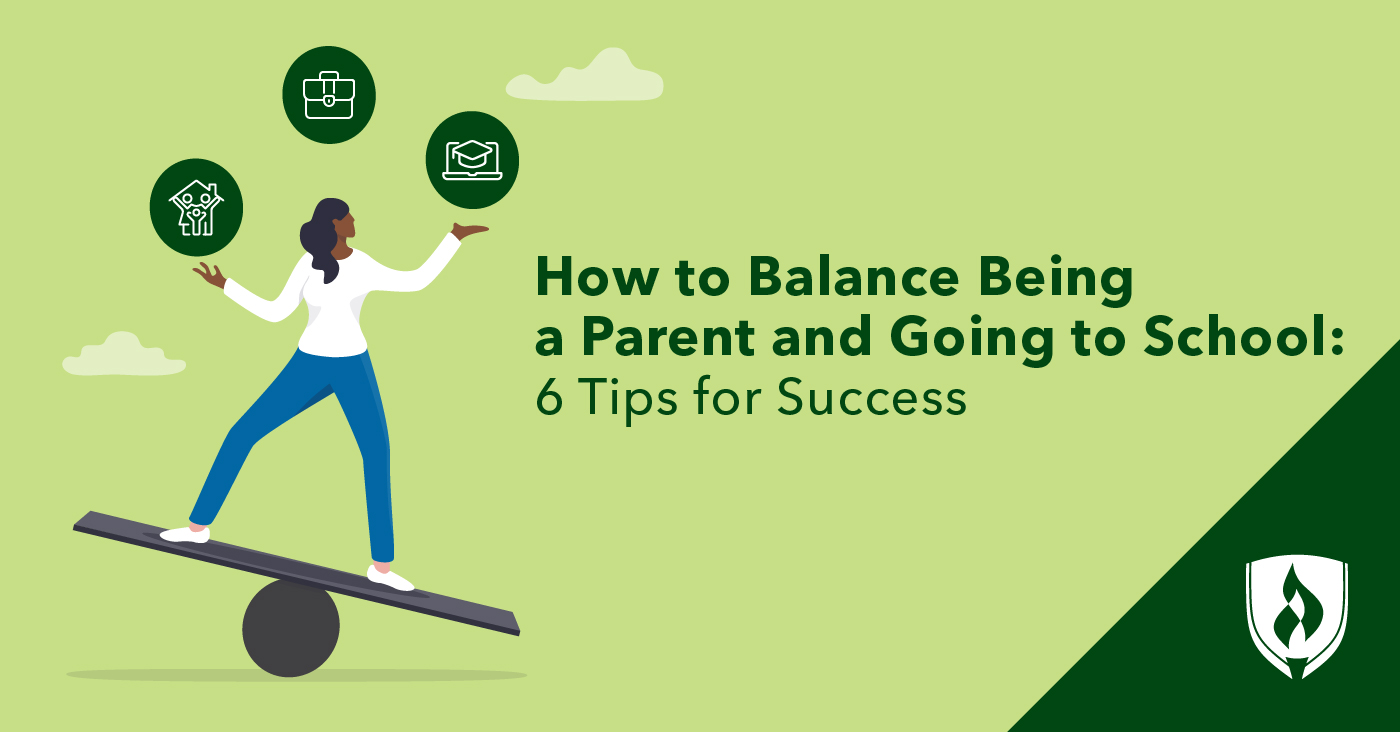How to Balance Being a Parent and Going to School: 6 Tips for Success
By Carrie Mesrobian on 02/14/2022

We all know that raising kids is a wild, beautiful ride. Unpredictable, hilarious, stressful, uncomfortable: parenting is often a literally and figuratively messy experience. Factor in the demands of full-time work, and it’s easy to understand why adding school to the mix can be a real challenge.
Yet, many parents find ways to make school, family and work a possibility. In fact, a report from the Institute for Women’s Policy Research found that parents raising children make up 22 percent of the undergraduate student population.1 While balancing school, parenting and jobs isn’t easy, many successfully earn their degrees every year.
To get a sense of what works, we talked to people familiar with the balancing act involved. Read on for advice on how to manage the college coursework, family responsibilities and the unexpected curveballs the world may throw your way.
Advice for parents thinking about college
1. Look for competency-based education options
Ashley Honeycutt, mother of two, Finance student and Peer Tutor at Rasmussen University, began her school and family balancing act by looking for programs offering flexibility. The competency-based education (CBE) courses she found at Rasmussen University were particularly appealing.
“I began with considering the credit load and types of courses,” Honeycutt recalls. “I knew that I would have more due dates to attend if I took a traditional class. Whereas, if I were to have a CBE course, I would be responsible for setting my due dates.”
While there are certainly deadlines in programs that offer competency-based education courses, there’s a lot more flexibility available to students in how they get their work done. For example, if you’re lucky enough to find you have an entire free day, you could choose to “work ahead” and take care of a substantial portion of an entire class. That means much less fretting about being available at set times and more focusing on mastering the material.
2. Call on your own support system
All of the parents we talked to recommended taking stock of your current support systems prior to enrolling in school. Having a clear picture of backup childcare options and their schedules is extremely helpful when unexpected issues like illnesses or a school lockdown due to the pandemic.
“My husband is like a backbone when it comes to getting a minute of peace from the kids, work and school,” says Alyssa Cremer, mother of two, IT Management student and Peer Tutor at Rasmussen University. “My older sister Christina has played a huge role model for me as a younger mother due to her having been in my situation before. She has given me lots of advice.”
3. Make friends with your planner
Both Cremer and Honeycutt report having difficult moments, late-night study sessions and unexpected issues, like illness or car accidents, that have made being a parent and a student stressful. Through all of it, both say that time management is something they must constantly negotiate and adjust.
For Cremer, the balancing act has multiple parts.
“Becoming aware of class assignments early on in the week to have lots of my assignments finished by the end of my work week,” she says. “Focusing on my time and knowing when I can do homework and get reasonable amounts of work done.”
Cremer uses a variety of methods to keep on top of her schoolwork. “Sticky notes, calendars and bullet journaling,” she says. “I have utilized a bullet journal the most since beginning my job as a Peer Tutor.”
Honeycutt says she’s had to work against procrastination.
“When I first began my program, I was doing all my homework on Sunday,” she recalls. “That feeling was very stressful and intense. I knew I needed to do something because I was putting myself through too much.”
Getting a calendar to help her plan was a big step.
“The calendar was also a great visual to see what needed to be done for the week,” Honeycutt says. “I purchased a big one, wrote all my agendas down and got everything organized for the entirety of the course. It took some practice, but I somehow created a routine before I knew it.”
4. Put school support resources to use
One of the biggest mistakes students make is to overlook or underuse the support resources offered. Get yourself familiar with what’s available and don’t hesitate to use them—you’re trying to learn, there’s no shame in asking for help along the way.
For Cremer and Honeycutt, becoming Peer Tutors was a big part of their success because this program formally opened their eyes to the wealth of resources Rasmussen University offers all students.
Peer Tutors offer students one-on-one help with academics, while Peer Educators help students become comfortable with learning the ins and outs of online learning and managing their course load. Library and Learning services offer online guides, eBooks and live chats designed to give support to students. When the time comes to start focusing on a job search, the Career Services team also helps connect students with resumes, job interview preparation and other resources that help navigate job searches, at any point in enrollment.
5. Keep self-care a priority
Though it can seem counterintuitive given your time constraints, self-care is necessary to keep yourself functioning. Remember, self-care doesn’t have to be a three-day spa weekend—there are smaller things you can do for yourself to recharge.
“I drink coffee,” says Cremer. “And take personal time for myself one day a week, to remain competent and to keep moving forward for me and my kids.”
Dr. Tasha Holland-Kornegay, a licensed professional counselor and director of Our Treatment Center, says she works with many busy parents who are in school and believes that self-care is vital to managing it all.
“Unwind like you mean it! Focus on the things that make you feel happy, confident and valuable,” Dr. Holland-Kornegay recommends. “Taking care of yourself will leave you with a lot more energy and joy to spread to the parts of your life that matter most.”
6. Remember your end goal
When you’re in the middle of doing something challenging, it can be easy to lose sight of why you’re putting in the work in the first place. Remember to stop and reflect on why you’re in school and what you’re hoping to accomplish.
Honeycutt enrolled in school after working in construction because she wanted to challenge herself.
“I loved the job and the people I worked with,” Honeycutt says. “However, I wanted more.” Honeycutt sought a career that wouldn’t just challenge her physically and remains firm in this motivation.
“Even as intense as some moments have been, I have pushed through and made sacrifices with the perspective that it’s all temporary,” Honeycutt says. “The tests and projects that I have stressed over have always passed and ended.”
Cremer always returns to what motivated her from the start: a better life for her children.
“What really pushed me the most was my son, Messiah,” Cremer recalls. “He was almost one year old, and I knew I wanted a better childhood for him than I had for myself, so I chose to enroll in school.”
Challenge accepted?
It’s undeniably a challenging feat to balance being a parent and attending college. But challenging doesn’t mean impossible. With the right support system, plans and determination, you can successfully manage both. To learn more about how Rasmussen University helps support its students every step of the educational journey, check out our article “Steps to Success Spotlight: How Peer Educators Can Help.”
1Lindsey Reichlin Cruse, Tessa Holtzman, Barbara Gault, David Croom and Portia Polk. “Parents in College By the Numbers” Institute for Women’s Policy Research. April 11, 2019. [Accessed February 2022] https://iwpr.org/parents-in-college-by-the-numbers/




